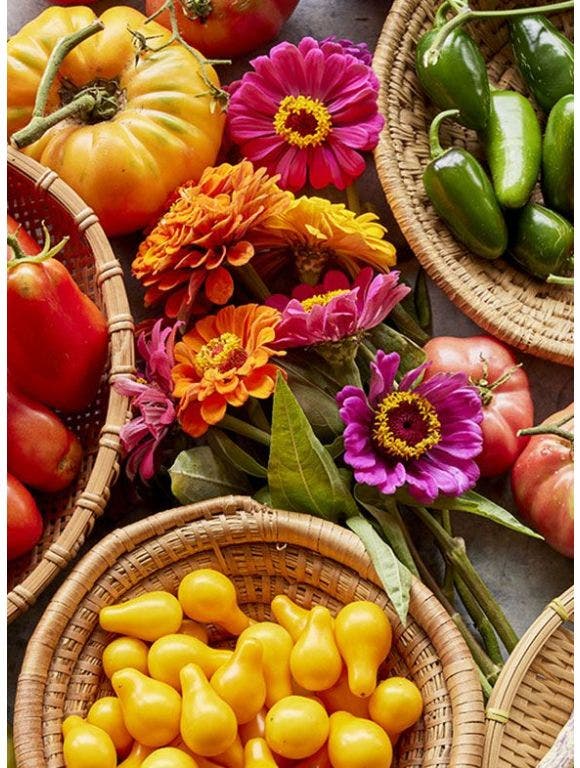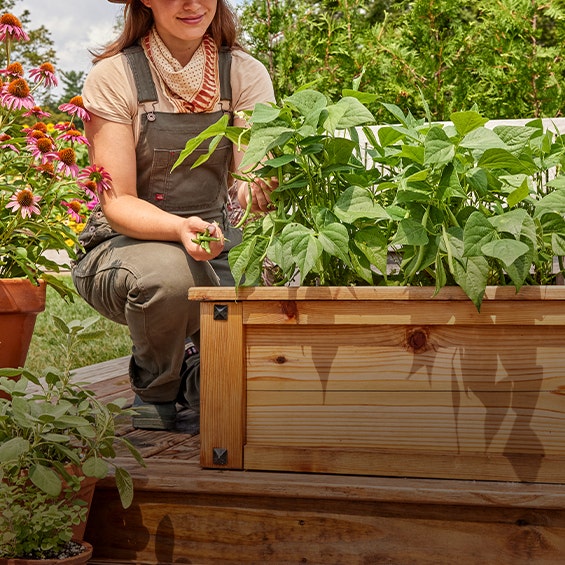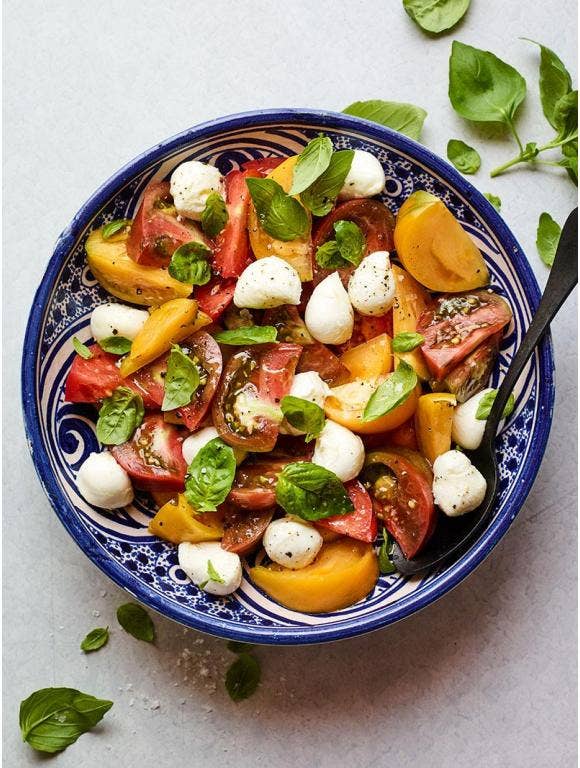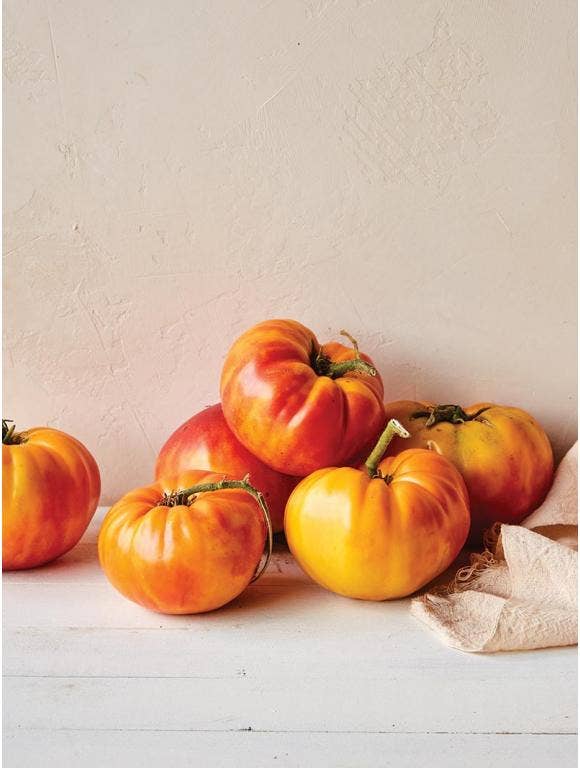


Heirloom seeds are the living antiques of the food universe, bringing their colorful histories into the heirloom garden and to the dinner table.
A visit to the farmer's market validates the popularity of heirlooms. People choose them for their unique flavors, unusual shapes and impressive spectrum of colors. Heirlooms also offer a connection to the past when fruits and vegetables were more authentic than their standardized, industrially produced grocery store counterparts.
The US Department of Agriculture's heirloom vegetable guide explains, "Since the 1970s, an expanding popular movement dedicated to perpetuating and distributing these garden classics has emerged among home gardeners…with interest and endorsement from scientists, historians, environmentalists, and consumers."
The Unique Characteristics of Heirloom Seeds
Gardeners save heirloom seeds because they consider them valuable—either for their superior taste or unique characteristics such as appearance, adaptability and overall performance—or perhaps too for the rich historical narrative imbedded in each seed.
What Makes a Seed an Heirloom?
An heirloom is something of unique value handed down from generation to generation. Your mother's silverware is a family heirloom she will likely pass down to you, and you will bequeath the set to your children.
It's the same thing with heirloom seeds and plants. The definition is subject to dispute but is generally described as cultivars introduced at least 50 years ago and, more generally, those that have been carefully saved and handed down from generation to generation. Some folks save heirloom seeds to establish a connection to their family and community heritage. But an heirloom's uniqueness extends well beyond its lineage.
One unique benefit of heirloom varieties is their genetic stability. The plants are open-pollinated—naturally pollinated by the wind, bees, birds or other animals—and will always grow "true to type," meaning they will resemble the parent plant and retain the same unique characteristics year after year. Your mother's tomato was the same as your grandma's, which was the same one your great-grandma cultivated. The tomato you grow today in your heirloom garden has the same growth habit, size, color and flavor as those from past generations
Do Heirlooms Taste Better?
Because hybrids combine varieties with the desirable traits of two similar plants—like the delicious Brandywine tomato—they tend to be hardy, disease resistant, consistent in shape and size, and with greater yields. Heirlooms may be more inconsistent than hybrids but are traditionally selected for their superior flavor and tenderness.
Are Hybrids Less Flavorful Than Heirloom Varieties?
Taste preferences are subjective. Some hybrids, such as the 'Sungold' hybrid cherry tomato, get high marks for flavor. For years, the 'Big Boy,' 'Early Girl,' and 'Celebrity' tomatoes, the 'Sweet Success' cucumber, and ‘Little Darling' watermelon have all been very popular hybrids. Most people just want a tomato that tastes like a tomato, not the flavorless fruits in big supermarkets. In the early days of hybrids, some varieties offered these favorable traits at the expense of flavor, but many of today's hybrids combine the best of both.
Unique Flavor Profiles, Textures, and Aromas
Hybrids combine two varieties the best traits of two similar plants that have different desirable traits. This results in plants—like the delicious Brandywine tomato—that are hardy, disease resistant, consistent in shape and size, and have greater yields. Heirlooms may more inconsistent than hybrids but they are traditionally selected for their superior flavor and tenderness.
What makes the black 'Spanish Round' radish, savored in Europe since the 1500s, the striped 'Listada de Gandia' eggplant from 1850, or the rich-hued 'Chioggia' beet from the early 1800s so enticing and popular? Not only do they have fascinating histories, but they also have delectable flavor profiles. With their diverse gene pool, heirlooms bring to the table an expansive variety of distinct colors, shapes, textures, growth habits and exceptional flavor profiles that most hybrid varieties cannot replicate.
Heirloom Favorites
Shop All HeirloomsDo Heirlooms Grow Better?
Despite their wonderful attributes and attractiveness to pollinators, gardening with heirlooms sometimes requires patience. Because they lack hybrids' vigor, heirlooms grow slower, produce fewer flowers and yield fewer fruits and vegetables. A bonus: heirloom seeds are more economical—they tend to cost less than hybrids, and saving seeds year to year saves money.
Unlike heirlooms, hybrid seeds cannot be saved. The following year’s crop will be less vigorous and more genetically variable as hybrids do not grow true to type.
Should Beginner Gardeners Start With Heirloom Seeds?
According to the National Gardening Association, many older heirloom cultivars were saved and passed down for generations because of their easy-to-grow habits, making them a perfect choice for the beginner gardener.
A good start might be to choose seed varieties that perform well in your region’s growing conditions. And for a beginner, there's no reason not to grow heirloom vegetables along with some hybrids.
Nostalgia and the Desire to Grow Heirlooms
Think of an heirloom seed like a family heirloom; it derives much of its importance from its story and its nostalgic connection to the past.
In her book Edible Memory: The Lure of Heirloom Tomatoes and Other Forgotten Foods, author Jennifer Jordan explores why a "growing number of people seek in heirlooms both a new culinary experience and a connection to a more generalized past."
Each heirloom cultivar comes with a unique cultural and historical narrative. For example, the 'Mortgage Lifter' heirloom tomato is named for a gardener in the 1930s who planted the four biggest varieties he knew about and crossed one with pollen from the other three. He continued this for six seasons to create a variety that produced immense, tasty fruit. He sold the plants for $1 a piece and paid off his $6000 mortgage in six years.
Then there's the unusually-shaped 'Lemon' cucumber that doesn't taste lemony. In the early 1900s, a peddler stirred interest in these small, oddly shaped cucurbits by spinning a now-debunked fictional yarn about their origins. He claimed he took an orange blossom from his daughter's wedding bouquet and used the pollen to fertilize a cucumber plant that developed into this citrusy-shaped fruit. Some horticulturists think that the tiny cucumber is the oldest one still cultivated today.
Should You Grow Heirlooms Exclusively?
Growing a diversity of plants promotes cooperation among different species and enhances the health of everything in the garden. Most gardeners go for a combination of flowers, herbs, and vegetables, planting some hybrids along with their heirlooms. Like taste, much is determined by personal preference. Can't decide? Try the 'Brandy Boy' hybrid with the rich flavor of the beloved 'Brandywine' heirloom tomato but with a more shapely form, neater growth habit, improved disease resistance and bigger, earlier yields.
Gardeners can cultivate their heirlooms to serve fresh from garden to plate alongside hybrids whose more robust harvests make them great for canning and preserving.
Along with their distinct flavors, shapes and colors, heirlooms have uncommonly great taste. Because they are open-pollinated and produce true-to-type plants, gardeners can save the seeds for replanting from one season to the next, unlike hybrids that won't produce the same plant the following year.
And some heirlooms are just lots of fun to grow. Take the heavyweight 'Atlantic Giant' pumpkin that can grow to a massive 200 pounds. Try lifting that big baby!
With so many heirloom varieties, it can be bewildering to choose between them. Explore the expansive range of classic favorite heirloom seeds and plants to begin your seed-saving journey. Choose varieties known to perform well in your hardiness zone and those appropriate for the length of your growing season. Over time, your heirloom seeds will eventually become accustomed to your region's climate, soil type and pests, to reward you for years to come.
With a bit of love and care, your garden can become the fertile ground in which the heirloom seeds you save today get passed on to the next generation of gardeners, along with their unique stories.


























